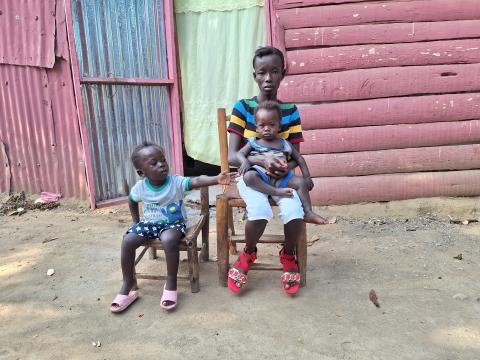I lost everything…

I lost everything. I couldn’t save anything.
Like a scratched vinyl, Nadège echoed those words ceaselessly throughout the interview. Whether relevant or not, they were the only utterances she could muster, the ones that clung to her reality, defining her existence. Her gaze, distant and vacant, avoided both the camera and interviewer as if unable to engage with the present. She saw but did not perceive; her world had flipped, leaving her stranded in a realm of trauma.
At a mere 26 years old, Nadège found herself frozen in time, her once vibrant life reduced to ashes in the wake of a fateful day. With two young children, James and Jamesley, her world was shattered as she was forced to flee, abandoning all she held dear – her home, her possessions, her very identity. The loss of her identification papers, she emphasized, left her in a state of limbo, unable to prove her existence in a world that demanded validation.
Her mind trapped in that harrowing moment, Nadège's life had ground to a halt. The passage of time meant little as she grappled with the trauma of her past, her present, and an uncertain future. Each day was a battle to reconcile the reality she once knew with the nightmare she now inhabited.
Nadège is traumatized.
But Nadège's plight is but a drop in the ocean of despair that grips Haiti in its cruel embrace. Across the land, thousands find themselves displaced, their lives upended by forces beyond their control. The statistics paint a grim picture of the scale of the crisis: 95,000 people have been displaced since last month, and 362,000 people are currently internally displaced, more than 180,000 of them children. It is a humanitarian crisis of staggering proportions, one that demands urgent attention and action.
Our partners have encountered a concerning trend: an increasing number of cases involving suicidal tendencies among displaced populations. Once considered taboo, these issues are now being more openly discussed, shedding light on the profound psychological toll of displacement.
For Nadège and countless others like her, the road to recovery would be steep and treacherous, fraught with danger at every turn. Successive displacements, coupled with violence, overcrowded living conditions, and economic instability, had taken a heavy toll on the hearts and minds of Haiti's displaced population. The specter of suicide loomed large, a silent testament to the despair that gripped their souls.
It is paramount to recognize the profound toll that trauma exacts on children and families caught in the throes of conflict. The harrowing experiences of displacement, violence, and loss leave indelible scars on the hearts and minds of those affected, particularly the youngest and most vulnerable members of society.
As we confront the humanitarian crisis unfolding in Haiti, we must prioritize the provision of comprehensive support and intervention to address the psychological distress gripping displaced populations. This entails not only meeting immediate physical needs but also delivering specialized mental health services and psychosocial support to mitigate the long-term effects of trauma.
By acknowledging and addressing the unique challenges children and families face in conflict, we can pave the way for healing, resilience, and the restoration of hope. Only through a concerted effort to address the multifaceted needs of those impacted by violence and displacement can we strive toward a future where every child and family can thrive despite the horrors they have endured.